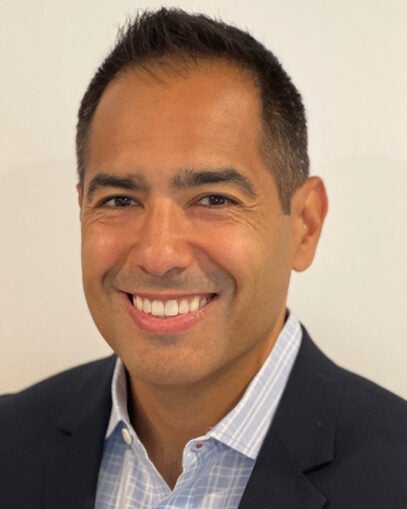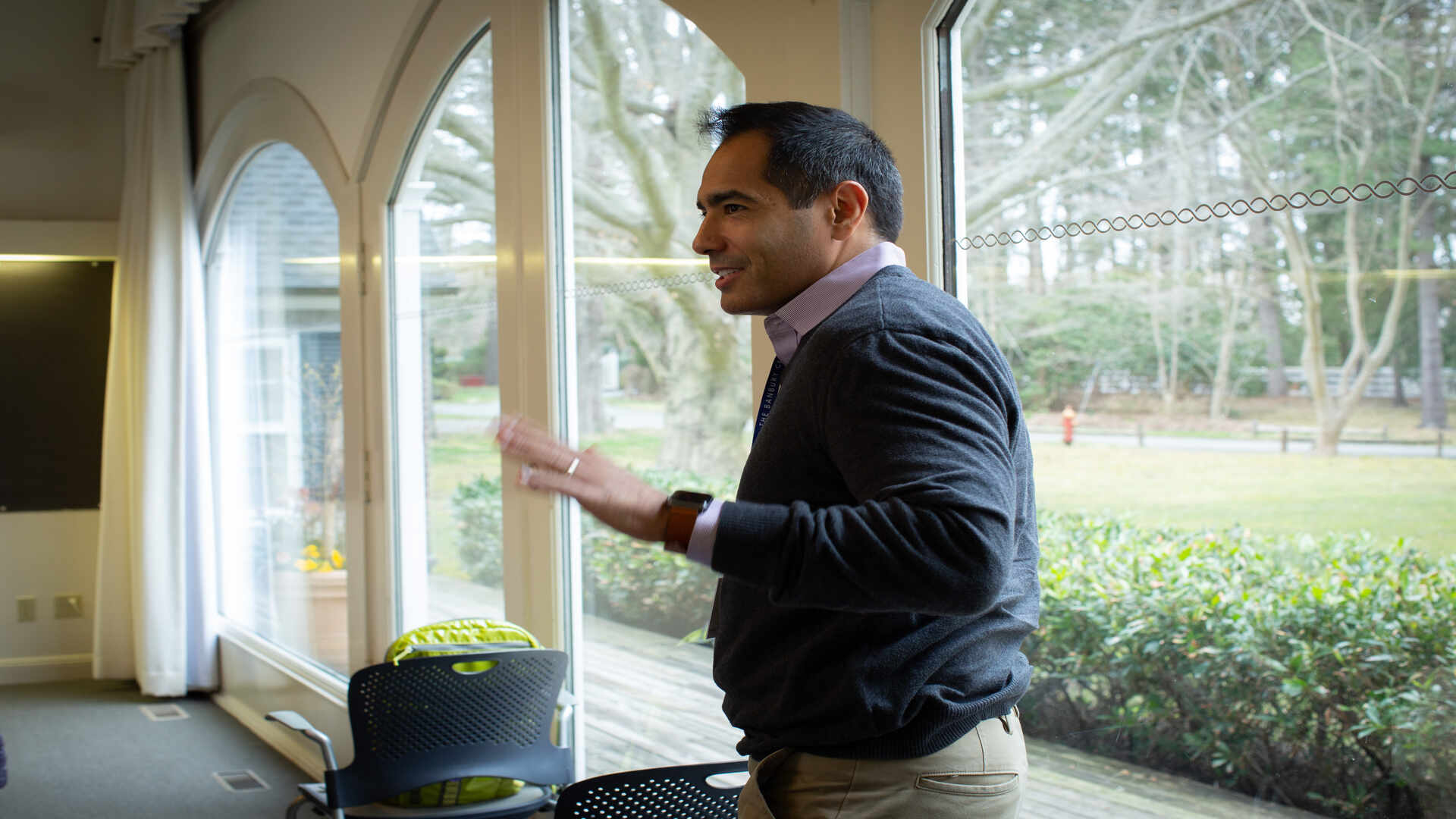In March 2023, the Banbury Center welcomed experts for “The Future of Investigational Medicine: Utilizing Science to Optimize the Early Phase Oncology Clinical Trial Effort.” During the meeting, I had the opportunity to sit down with Marcus Goncalves, M.D., Ph.D. Dr. Goncalves is an endocrinologist and laboratory scientist at Weill Cornell Medicine. He received his B.S./M.S.E. from Johns Hopkins University, and his M.D./Ph.D. from the University of Pennsylvania. We spoke about his experience leading a lab that investigates the effects of diet and cancer on the host tissues that regulate systemic nutrient metabolism.

Can you tell me about what you do in, more or less, two sentences?
I’m an endocrinologist and basic scientist, and my interest is in the host-tumor connections that alter systemic metabolism. We try to manipulate this connection using either diets or metabolic inhibitors paired with other anti-cancer therapy.
What sparked your interest in the impact of diet and endocrinology on tumor metabolism and growth?
Diet has such a profound impact on metabolism, and this was known for a long time in the diabetes and obesity world. For example, if you reduce carbohydrates in a diet, you drop insulin levels up to 60 or more percent. Lew Cantley and others have shown that insulin can drive tumor growth, so it got me thinking, “Can we use diet to suppress insulin, and then use that as cancer therapy?”
What is your favorite part of what you do? What gets you excited to go to work?
I am in it for the puzzle-solving, and I love being on the cutting edge of science. Every patient I see and every bit of data I get is a new piece of the disease puzzle. I get excited when I put them together and find something unexpected, either from my lab members or patients having an unusual phenotype. With those puzzle pieces, I try to come up with the latest way to create a new therapy.
Can you tell me about the best mentor that you’ve had? As a mentor yourself, what is important for you to impart on your students?
I’ve been blessed with great mentors; it’s hard to pick just one. Andre Levchenko, Rex Ahima, and Lew Cantley each had different qualities, but they were similar in that each got very excited about science and new findings. Their excitement has stuck with me and kept me going in my career. I try to impress this feature upon my trainees, too – I want them to be as excited as I am to come back the next day and keep working at it. This business is made up of peaks and valleys, and the valleys can be quite low. So, you need that excitement to get you through those times.
What are some of the challenges you face in your work?
The academic model of research is flawed in certain ways; one barrier is that we cannot pay our postdoctoral fellows enough to recruit and retain excellent talent. This creates a state of constant turnover in personnel, which disrupts our productivity.
Another barrier is the lack of cooperativity in research. You cannot just call up somebody else and say, “Can you run this assay for me?” Instead, you have to meet with a collaborator, explain your experiment, and then hope they will help you, but most likely, they won’t. Even in places that have good core facilities, it’s a problem to get your specific assays done. Conversely, pharma and biotech companies can pay scientists what they are worth and everyone in the company is aligned to help you make progress.
What is a common misconception about your work?
The major one is that diet is going to be a cure-all for everything. This idea is amplified heavily by small communities of enthusiasts that have a large influence on social media, but there is not great data to support it. I am routinely asked about using specific diets for indications with no evidence. Patients will say, “I was just diagnosed with cancer, [so-and-so] says I should be eating this diet.” Our approach has been very targeted: find the tumor types where diet intervention may have the biggest impact, study those, and if that works, possibly move on to the next tumor type. We have to be selective because the one-size-fits-all model does not work for cancer therapy or diet interventions.
Is there a recent development in your field that you believe will have a large impact?
The field of diet and cancer is pretty hot right now, I think; it’s moving at a very rapid pace. Data from clinical trials that were started two or three years ago is beginning to come out. The fasting-mimicking diet (FMD) data that I presented was really exciting because there were some complete responses in that data set; I think it will inspire more people to do those studies. I also feel like the tide has turned in terms of the oncologists’ perspective. Traditionally, they were skeptical of the idea of diet as a therapy, which was appropriate given the lack of data. Now, I find more oncologists are more open to these studies because there is more rigorous data coming out. Even at this meeting with the best clinical trialists from around the world, I am sensing that they are more receptive.
What is your biggest hope for the future of your field?
I would love to have a study in which a diet-drug combination therapy is shown to significantly improve anti-tumor efficacy; that would really be a home run for the field and is something that we lack. Even one victory would inspire and expand the field. We’ve tried our best to optimize our chances of success by limiting the focus, using a very rigorous design, and providing food to people to ensure that it’s consumed in a certain way. So, I would love to see a successful result.
This is your first time at the Banbury Center. What do you think of the meeting so far?
It’s been excellent! I love how we have multiple disciplines represented here; we have statisticians, oncologists, clinical trialists, an endocrinologist – it’s so diverse. Also, because the meeting is very small, I can connect with each person on a one-to-one level. Lastly, I like that you are trapped here, basically [laughs]. Even if you don’t want to interact with people, you have to interact with them because there is nowhere else to go. That’s nice, because it’s very easy at other meetings to say, “I’m going out to dinner or heading elsewhere tonight.” Here, you’re going out to dinner in the dining room.
Has there been a general topic or discussion that you’ve particularly enjoyed?
I feel like much of the first day was about the nuts and bolts of phase one clinical trials, and though I don’t live in that world, I run into the same problems when making decisions about dietary intervention studies, many of which are pilot studies. You have to decide, for example, if you continue doing this approach in a bigger study, which requires fundraising and a great deal of effort. So, the discussions about making go/no-go decisions and figuring out the right PK/PD (pharmacokinetic/pharmacodynamic) measures have been really helpful for me.

